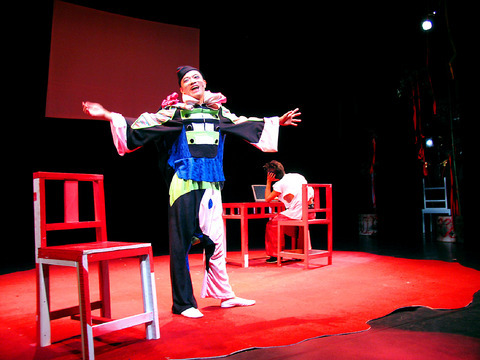The New Idea Theater Festival began last night at the National Theater of the CKS Memorial Hall with the first of three pieces by Taiwan's leading experimental theater troupes. Performances run tonight through June 5, in Chinese and Taiwanese.
Putting arguably the festival's best foot forward is one of Taiwan's more established experimental troupes, Golden Bough Theater (
It has given free reign to their players to script three vignettes that focus on friendship, love and death and the result is an evening of surprisingly mature and cohesive theater. This is experimental, and it works.

PHOTO: DAVID MOMPHARD, TAIPEI TIMES
Stage veteran Wu Peng-feng (
Meetai, in his scene, gives a memorable performance as a Hindu devotee who encounters a god. His musical use of Hindi overcomes what might otherwise be a language barrier.
In the decade since it was founded, Golden Bough Theater has made a name for itself by performing everywhere from formal theaters to small-town night markets throughout Taiwan. Their style is marked by a fusion of modern theater elements with traditional Taiwanese opera.
Audiences who caught Golden Bough players performing My Dinner with Shakespeare last month will recognize the troupe's preferred modus operandi in All in One; a series of scenes with a joining theme that are both far out and grounded in reality.
The coming two weekends will see another two of Taiwan's experimental troupes tread the boards. Xitian Society Musical Workshop (
2:30pm matinee on Sunday. Portrait of Love has similar showings next Thursday, May 26 through May 29 and Who is Planning a Scheme will run June 3 to June 5 at 7:30pm, with matinees on Saturday, June 4 and Sunday, June 5 at 2:30. All performances are at the Experimental Theater of the National Theater (國家戲劇院實驗劇場), 21-1, Zhongshan S Rd, Taipei (台北市中山南路21-1號). Tickets for each performance are NT$400 or NT$960 for all three and available at the CKS Cultural Center or on the Web at www.artsticket.com.tw. For more information, call (02) 3393 9888.

As Taiwan’s second most populous city, Taichung looms large in the electoral map. Taiwanese political commentators describe it — along with neighboring Changhua County — as Taiwan’s “swing states” (搖擺州), which is a curious direct borrowing from American election terminology. In the early post-Martial Law era, Taichung was referred to as a “desert of democracy” because while the Democratic Progressive Party (DPP) was winning elections in the north and south, Taichung remained staunchly loyal to the Chinese Nationalist Party (KMT). That changed over time, but in both Changhua and Taichung, the DPP still suffers from a “one-term curse,” with the

William Liu (劉家君) moved to Kaohsiung from Nantou to live with his boyfriend Reg Hong (洪嘉佑). “In Nantou, people do not support gay rights at all and never even talk about it. Living here made me optimistic and made me realize how much I can express myself,” Liu tells the Taipei Times. Hong and his friend Cony Hsieh (謝昀希) are both active in several LGBT groups and organizations in Kaohsiung. They were among the people behind the city’s 16th Pride event in November last year, which gathered over 35,000 people. Along with others, they clearly see Kaohsiung as the nexus of LGBT rights.

Jan. 26 to Feb. 1 Nearly 90 years after it was last recorded, the Basay language was taught in a classroom for the first time in September last year. Over the following three months, students learned its sounds along with the customs and folktales of the Ketagalan people, who once spoke it across northern Taiwan. Although each Ketagalan settlement had its own language, Basay functioned as a common trade language. By the late 19th century, it had largely fallen out of daily use as speakers shifted to Hoklo (commonly known as Taiwanese), surviving only in fragments remembered by the elderly. In

Dissident artist Ai Weiwei’s (艾未未) famous return to the People’s Republic of China (PRC) has been overshadowed by the astonishing news of the latest arrests of senior military figures for “corruption,” but it is an interesting piece of news in its own right, though more for what Ai does not understand than for what he does. Ai simply lacks the reflective understanding that the loneliness and isolation he imagines are “European” are simply the joys of life as an expat. That goes both ways: “I love Taiwan!” say many still wet-behind-the-ears expats here, not realizing what they love is being an